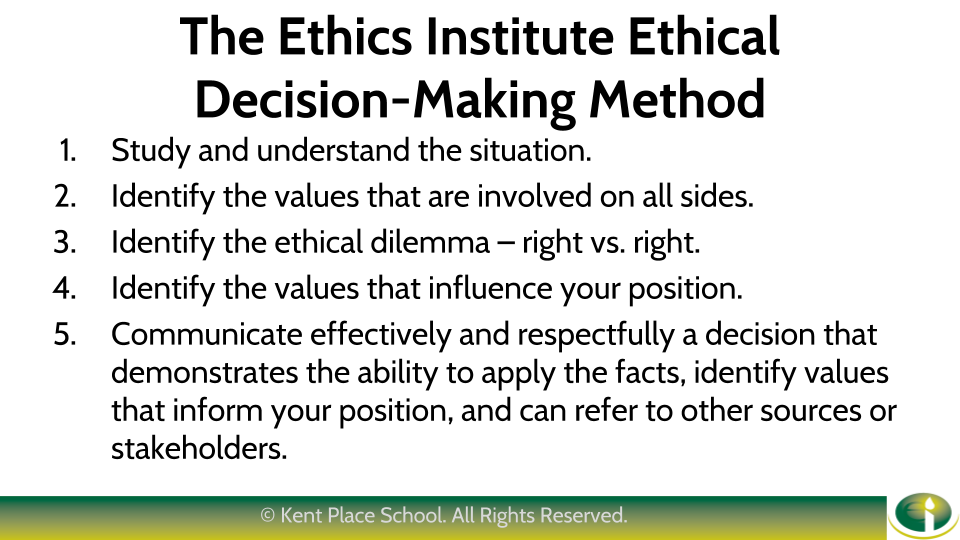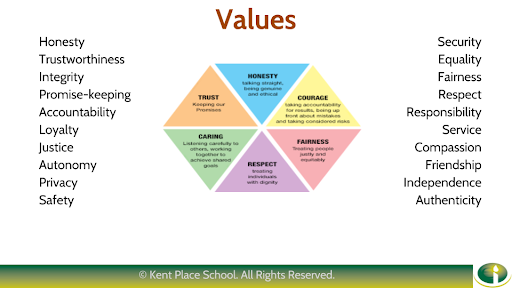Teaching ethics to children and teenagers
The Ethics Institute* at Kent Place School is devoted solely to teaching ethics to primary and secondary school students, said Karen Rezach, the institute’s director. “There are so many ethics institutes at the university level, but none at our level,” she said. Like Lone, Rezach thinks kids and teenagers long for ethical guidance. “We’re trying to teach them how to exist in this world,” she said.
Children at Kent Place are introduced to ethics in fifth grade, during what would otherwise be a health and wellness class. Rezach engages the students in simple case studies and invites them to consider the various points of view. She also acquaints them with the concept of right vs. right—the idea that ethical dilemmas often involve a contest between valid but conflicting values. “It’s really, really, really elementary,” she said.
In middle and upper school, the training is more structured and challenging. At the core of this education is a simple framework for ethical decision-making that Rezach underscores with all her classes, and which is captured on a poster board inside school. Paired with this framework is a collection of values that students are encouraged to study and explore. The values and framework for decision-making are the foundation of their ethics training.

Once a month, all middle school students grapple with an ethics case study during advisory that’s been written for their grade. Sixth-graders, for example, wrestled with a case about “Emma”, who wasn’t invited to Jane’s party but who saw pictures of the festivities on Instagram. The students then discussed various questions: How might Emma feel when she sees the Instagram photo? What is Jane’s responsibility in this case? What values influence the way you think about this scenario? Though the case studies reflect real-life problems the kids have encountered, the stories are told in the third person, which frees them to talk openly, Rezach said.
Two elective courses on ethics for seventh- and eighth-graders explore deeper quandaries while pressing students to understand the values reflected in those views. In one case study they discussed, “Allison” enters a coffee shop wearing a T-shirt with a swastika, which clearly offends other customers. What should the manager do? How does one balance the right to freedom of expression with the rights of the community? “In this situation, as in all ethical dilemmas, the students have to weigh the benefit and the harm,” Rezach said. She draws connections to books they’re reading in English class, brings up related news stories, and asks students to think of and share ethical quandaries they’ve encountered.
For homework, students study critical historical documents, like the Constitution and Bible, and identify the values that suffuse the work. In another assignment, they prepare a two-minute oral presentation on a principle that matters deeply to them. Some will read a poem, or sing a song, or produce a video that reflects that value. Once the presentations end, Rezach pairs up students with conflicting ideals—compassion versus justice, for example—and asks them to write a case study together.

High school students interested in ethics have other ways to learn. Fourteen kids meet weekly after school on an ethics bowl team, which competes nationally against other schools. In bioethics class, an elective, students explore a particular ethical problem related to a single theme—such as “Environment and Health,” this year’s subject—then present and defend their position at a spring symposium. The ethics club is launching an Instagram account, @ethicseverywhere, which will pose an idea or dilemma for all student followers to reflect on. And during the summer, students can apply for shorter programs, one on the ethical issues surrounding science and technology and the other on ethics in business.
Impact on students
Research suggests that ethics training improves academic performance. Children in Scotland who had been taught to think about ethical decision-making and the responsibilities of citizenship showed improved reasoning abilities. A study in Australia showed that young students who took part in a class on “dialogue-based ethical inquiry” were better able to evaluate and construct reasoned, ethical arguments. Standardized test scores for children who studied “collaborative philosophical enquiry”—a variant of ethics training—went up in verbal, nonverbal, and quantitative reasoning. And a small study conducted by researchers at Penn State revealed that even preschoolers can engage with and learn from simple ethical instruction.
Academic benefits aside, students at Kent Place involved in ethics training relish the open-ended conversations with peers along with the chance to reflect on what matters to them. “I love discussing these things with other people, and hearing other points of view, especially on controversial topics,” said Alexandra Grushkin, an eighth-grader. The value she selected that’s most dear to her is integrity. “I believe you’re a good person if you have integrity,” she explained. In her class presentation, she shared a quote by author Lynne Namka that reflected this value. Alexandra was matched with a student who chose loyalty, and the two crafted a case study that captured the tension between these principles: What does a student do when she spots her close friend cheating in a school competition?
Encouraged at home to listen to others’ opinions, Alexandra said that she’s better able now to understand the ideals that undergird beliefs and to articulate her own positions. “It has changed the way I approach conflict—and most things, actually,” she said. “With ethics, I’ve learned that there are a lot of different sides to everything.” What Alexandra’s mother, Trisha, welcomes in this training is the open-mindedness it provokes, as well as the instruction it provides in how to converse calmly. “There’s a humility that comes with this ethical framework that will serve them well for the rest of their lives,” she said.
Rezach believes that students benefit from an ethics education in many ways. “For the first time in their lives, they’re allowed to think for themselves—without someone telling them what to think,” she said, adding “It’s like you’ve taken the lid off the top of their minds.” For teenagers who often struggle with confidence and identity, these debates on ethics free them to test their values in an abstract, unthreatening way. Exploring conflicts from different points of view—and striving to understand the value behind an opinion—also makes them more empathetic to others. “I see them grow in their ability to see somebody else’s perspective,” Rezach said. Having to identify and defend their decision is also critical, she added. Ordinarily, students she encounters avoid making decisions because they fear they’ll get it wrong. “Being able to make a decision and articulate why—that’s huge!” she said. “And being respectful to a person who doesn’t agree—that’s huge.”
Rezach writes the case studies, teaches the classes and overseas all the extracurricular ethics programs. She has also consulted with about 100 other middle- and high schools that want to bring this discipline back to their communities. “It can’t be a one and done,” Rezach said about how to build an ethical student body. “You have to infuse it into current programs—in classes and after school,” she added.
Now a college freshman, Sophie Huttner said she continues to apply the analytical frameworks she absorbed in her ethics training to her studies at Yale. “My ethics education, above all, has functioned as a mirror, allowing me to reflect on my own values and those held by my community,” she said. “Because I have had the chance to consider at length the ethical concepts most important to me, I have become a better judge of my own actions.”




